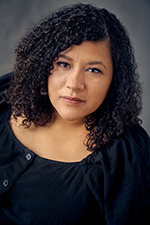Early bird discount—$15 off!

Submit your poetry, short fiction, and/or creative nonfiction by November 1, 2021 at 11:59pm PST for a chance to win one of three CAD $2,000 prizes and publication!
This year's judges are:
Conor Kerr (poetry; interview below)
Zilla Jones (fiction; interview below)
Erin Soros (cnf; look for an interview in October's newsletter)
Plus, if you enter before September 30, you'll get an early bird discount—$15 off your initial entry fee!
Early bird discount until Sep. 30, 2021 entry fee (comes with a one-year print subscription):
$20 CAD for each entry from Canada
$30 CAD for each entry from elsewhere
$10 CAD for each
additional entry, no limit!
Full contest guidelines on our website.
Open Season Awards:
interviews with the judges
Zilla Jones—fiction judge
 Malahat Review volunteer Tanisha Khan talks with the Open Season Awards contest fiction judge about the limitations and freedoms of a 2,500-word story, the research involved in writing historical fiction, and the importance of endings. Malahat Review volunteer Tanisha Khan talks with the Open Season Awards contest fiction judge about the limitations and freedoms of a 2,500-word story, the research involved in writing historical fiction, and the importance of endings.
TK: As a judge what are you searching for in a winning story?
ZJ: I want to read the story that only you can write—the one that is in your heart demanding to be released, that doesn’t let you rest until you write it down. I want stories that fill my head long after I have stopped reading, that help me see the world a little differently because they have changed me. At this point, you are probably all asking, what exactly is she talking about? So I’ll try again. In writing a 2,500-word story, think about both the limitations and the freedoms of such a tight word count. You can’t tell a big epic tale about a person’s whole life or events that unfold over several days, weeks or years. You have to be very sparing with back story and extraneous description. You can’t have a massive cast of characters. You need to give me a slice, a moment, a day in the life, a single interaction. And in that short time, you must draw at least one unforgettable, unique, compelling character and take me to some kind of discovery or realization. Bonus points if you can play a little with the form and structure of the short story or if you have thought carefully about point of view and perspective: who needs to tell this story and why, and does the voice draw the reader in? Another thing: we don’t talk enough about plot in literary fiction. A great character, an interesting setting, searing dialogue: all wasted if the story doesn’t go anywhere and something intriguing doesn’t happen. And lastly—think about your ending. I want to see strong, moving endings that have arrived, that are exactly the point where this story should finish, where things are resolved and yet there is more to think about. We spend a lot of time on our beginnings, and often the endings fizzle out. Don’t fizzle out!
Read the rest of Zilla Jones' interview.
Conor Kerr—poetry judge
 Malahat Review Fiction Board intern Sarah Lachmansingh talks with the Open Season Awards contest poetry judge about his search for poetry that kicks colonialism in the face, how submitting poetry can be a bit like duck hunting, and his gratitude for every single reader. Malahat Review Fiction Board intern Sarah Lachmansingh talks with the Open Season Awards contest poetry judge about his search for poetry that kicks colonialism in the face, how submitting poetry can be a bit like duck hunting, and his gratitude for every single reader.
SL: What qualities are you looking for in a winning poem?
CK: Something fun. I love writing where you can tell that the poet is just having an absolute blast writing it out. Playfulness, honesty, mistakes, I think all of these things are necessary for good poetry. Not that I really know what good poetry is from an academic sense or even a “writer” sense (uh-oh, bad contest judge choice Malahat Review…… duh duh duh) but I do know what is entertaining, what is thought provoking, what brings up a feeling. I love poetry that you can’t shake. You need to take a walk and stare at some magpies, or seagulls, or seals or something to get back to reality. Bonus points for poems that feature fast food, specifically Dominos or A&W (joking, or am I?).
Make that poem sing. Make it breathe.
Make it kick colonialism in the face.
Or at least make us think about the structures that exist around us.
Do not write a poem about old white dudes, boats, or weird colonial aspects (ie., Christian/Catholic guilt). I don’t need to read that shit and I don’t think anyone does at this point. We’ve had enough of that in this world.
Read the rest of Conor Kerr's interview.
|